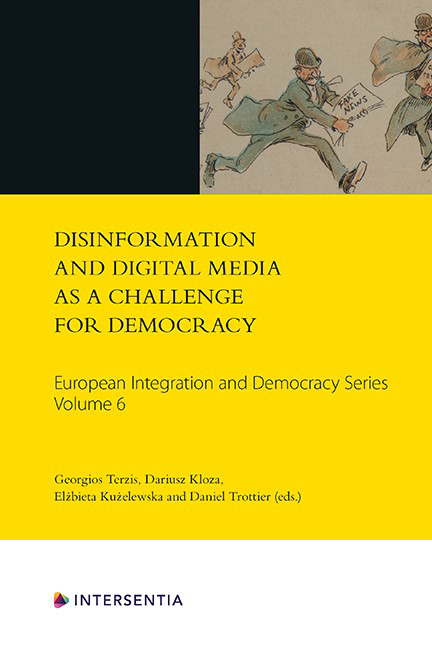Book contents
- Frontmatter
- Foreword: Fooling All of the People All of the Time: Democracy in the Age of Fake News
- Introduction: ‘They All Hear “Ping” at the Same Time’
- Contents
- List of Abbreviations
- List of Contributors
- PART I THEORETICAL APPROACHES TO AND THE CONCEPTUALISATION OF DISINFORMATION
- PART II EXPERIENCE OF DEALING WITH DISINFORMATION
- PART III SOLUTIONS TO DEAL WITH DISINFORMATION AND THEIR CRITIQUE
Foreword: Fooling All of the People All of the Time: Democracy in the Age of Fake News
Published online by Cambridge University Press: 26 May 2021
- Frontmatter
- Foreword: Fooling All of the People All of the Time: Democracy in the Age of Fake News
- Introduction: ‘They All Hear “Ping” at the Same Time’
- Contents
- List of Abbreviations
- List of Contributors
- PART I THEORETICAL APPROACHES TO AND THE CONCEPTUALISATION OF DISINFORMATION
- PART II EXPERIENCE OF DEALING WITH DISINFORMATION
- PART III SOLUTIONS TO DEAL WITH DISINFORMATION AND THEIR CRITIQUE
Summary
George Orwell's statue stands outside BBC Broadcasting House in central London. His presence serves to remind this news organisation to have no fear of government or seek any favour in reporting accurately and fairly on the news of the day. Orwell's Nineteen Eighty-Four is the classic text on the role of propaganda and the distortion of language in reshaping reality. He famously said: ‘if liberty means anything at all, it means the right to tell people what they do not want to hear’. Yet Orwell associated the world of ‘two and two made five’ with the totalitarian powers of the 1930s and 1940s. They had the Big Brother dictators who could control all the instruments of public messaging and the ability to screen out alternative sources of information that made an alternative reality possible. The first step towards taking away individual freedom and the capacity for independent action is to deprive people of their access to factual information. This was the hallmark of the communist states that sprang up in Eastern Europe during the Cold War years. As the Czech playwright, dissident and later president Vaclav Havel put it, largely echoing Orwell: ‘if the main pillar of the system is living a lie, then it is not surprising that the fundamental threat to it is living in truth’.
When the Berlin Wall came down 30 years ago, the change was largely attributed not to Western military pressure on the Soviet Union and its satellite states, but to the ultimate ability of the West to penetrate the Eastern firewall with its own news and information. The Germans from the East watched West German television and broadcasters such as the BBC World Service, Voice of America and Radio Free Europe managed to reach large audiences despite the best efforts of the local regimes to jam them. The leader of Solidarity in Poland, Lech Wałęsa, attributed the success of this movement to the Catholic Church and Radio Free Europe.
- Type
- Chapter
- Information
- Publisher: IntersentiaPrint publication year: 2020



